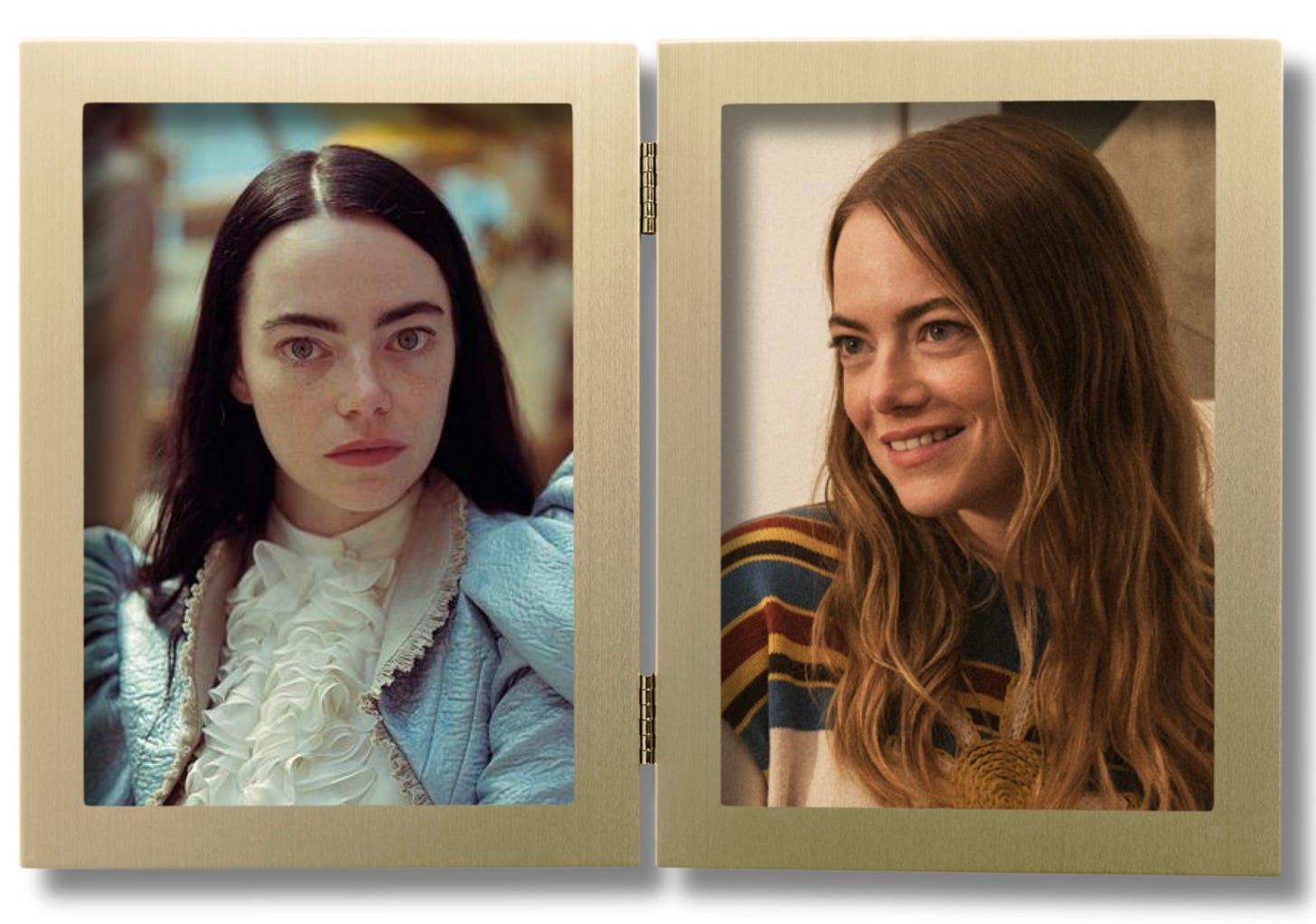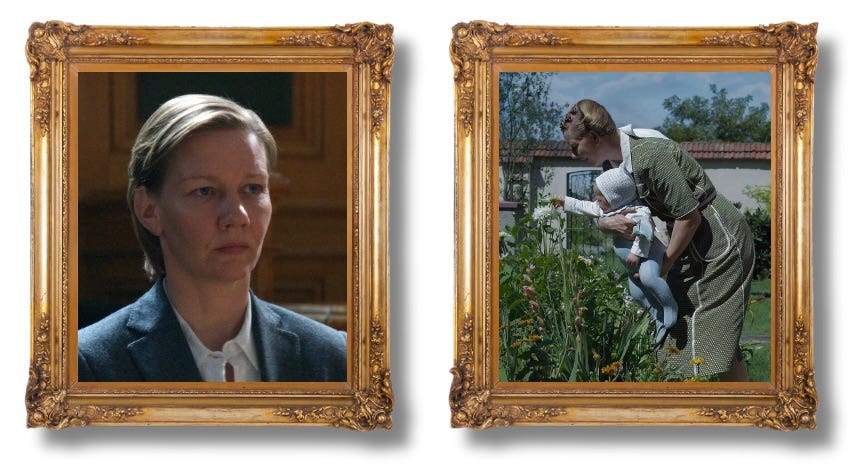Oscar, Actors and the Double Exposure Effect
What happens when noms have two great performances out at the same time? History has the answer

With the announcement of this year’s Academy Award nominations behind us, the long march — a bit of a forced slog, really — to the 96th Oscars on March 10 has begun. And just as soon as the noms were revealed, the pundocrats rushed to predict the likely winners. In the supporting acting categories, the general consensus that Oppenheimer’s Robert Downey Jr. and The Holdovers’ Da’Vine Joy Randolph have it in the bag is nearly universal. For actor and actress, the prognosticators are somewhat more split between The Holdovers’ Paul Giamatti and Oppenheimer’s Cillian Murphy on the male side, and Poor Things’ Emma Stone and Killers of the Flower Moon’s Lily Gladstone for the female honors.
But despite the urge to declare races over even as they’ve just begun, there is the matter of what former Secretary of Defense Donald Rumsfeld liked to call the “known unknowns.” Ostensibly, the acting Oscars honor individual performances in specific films. It’s not always that simple, though. An actor’s overall career can come into play, whether it’s rewarding a veteran for the latest in a string of impressive performances or hailing a newcomer who shows exceptional promise. There’s the matter of how charming — friendly, engaging, grateful! — a nominee comes across while working the awards circuit. And then there’s also what could be called the Double Exposure Effect, the extra praise that’s heaped on a performer earning added kudos for other films or TV shows that appear simultaneously alongside an Oscar-nominated turn.
There’s the example of Jessica Chastain, named best actress two years ago for The Eyes of Tammy Faye. In her quest for an Oscar, it didn’t hurt that the same month that Tammy Faye was released in 2021, HBO began rolling out the five-part mini-series Scenes from a Marriage. In that lacerating drama about marital discord, Chastain played a work-obsessed tech exec who challenged the very sexual stereotypes that her portrayal of Tammy Faye embraced. Her contrasting performance in Scenes worked to underscore the transformation Chastain underwent in Tammy Faye, as if to give her eventual Oscar victory an added seal of approval.
Similarly, back in 2014, just days after Matthew McConaughey was nominated as best actor for his work as an unlikely AIDS activist in Dallas Buyers Club, HBO began airing True Detective, in which McConaughey played a haunted Louisiana homicide detective. Taken together, the two performances underlined McConaughey’s evolution from shirtless rom-com hunk to serious actor unafraid to tackle difficult material. And, of course, that resulted in his best actor Oscar win.
On the flip side, an ill-timed release can damage an Oscar campaign, as Eddie Murphy learned in 2007 when he was nominated as best supporting actor for playing an R&B showman in Dreamgirls. Critics applauded, he won a Golden Globe and SAG Award, but then, with Academy voting underway, Paramount released lowbrow rom-com Norbit, in which Murphy played multiple roles, including an obese woman. The reviews were damning — the Rotten Tomatoes score amounted to just 9 percent. And after losing the Oscar to Little Miss Sunshine’s Alan Arkin, Murphy made a quick exit from the theater.
The Twin Peaks of 2024

This season, a number of the nominees could benefit from such double exposures. German actress Sandra Huller — for American audiences, she’s a veritable discovery — is a best actress nominee as a woman weathering an accusation of murder in Anatomy of a Fall, but Academy viewers will spend just as much time with her in the best international film nominee The Zone of Interest, in which she played a selfishly malignant housewife in Nazi Germany. Both the Los Angeles Film Critics Association and the National Society of Film Critics named her the year’s best actress, citing both films.
Best actor nominee Colman Domingo also demonstrated his versatility by turning in two widely different performances: In Rustin, for which he’s a best actor nominee, he portrayed civil rights leader Bayard Rustin, a charismatic gay man working behind the scenes to successfully orchestrate the 1963 March on Washington at which Martin Luther King, Jr. took center stage. And, as the year came to a close, he was also on screen in The Color Purple as the abusive and violent Mister. His big-screen prominence earned him an Out magazine cover proclaiming him as “The First Black Gay Movie Star,” signaling that a win for him would be historic.

Lily Gladstone, the moral center of Killers of the Flower Moon — as an indigenous actress, her nom is just as historic — also had another starring role last year. For her work in Morrisa Maltz’s indie road movie The Unknown Country, she was recognized with a Gotham Award for outstanding lead performance. But since the film received only a token release from Music Box Films, it hasn’t gotten quite enough attention to become a factor in Gladstone’s Oscar campaign.
Meanwhile, in addition to the films for which they are nominated, some of the other nominees have taken on smaller film roles that attest to their range. Carey Mulligan was at first almost unrecognizable when she popped up in a frizzy red wig in Saltburn as a brittle and unwelcome houseguest — a far cry from her best actress-nominated performance as the charming and luminous Felicia Montealegre in Maestro. With dozens of screen roles behind him, Jeffrey Wright, a best actor nominee for his frustrated author in American Fiction, was part of Wes Anderson’s deadpan ensemble in Asteroid City, playing a general attempting to take charge of an alien encounter, and then appeared again as Bayard Rustin’s nemesis, Harlem kingpin Adam Clayton Powell, Jr., in Rustin. Also in Rustin, supporting actress nominee Randolph made a brief appearance as singer Mahalia Jackson.
Also Playing on Streaming
Meanwhile, a couple of other nominees burnished their 2023 resumes on streaming series. Giamatti, whose irascible prep school teacher in The Holdovers resulted in his best actor nom, wrapped up seven seasons of Billions, where he played sadomasochistic attorney Chuck Rhodes. Poor Things’ supporting actor nominee Mark Ruffalo plunged into the French resistance during World War II in the limited series All the Light We Cannot See. And Randolph, in yet another appearance, racked up an additional credit as a music manager in The Idol.

But among this year’s acting nominees, it’s really Jodie Foster and Emma Stone who’ve emerged as the two leading exemplars of the Double Exposure Effect.
A two-time Oscar winner, Foster spent much of the past decade-and-one-half behind the camera, directing film and TV. So her reappearance on screen — first, in her nominated supporting role in the inspirational Nyad and then in HBO’s noirer-than-noir series True Detective: Dark Country. The roles couldn’t be more different. In Nyad, she played long-distance swimmer Diana Nyad’s best friend and coach, looking on with equal measures of care, impatience and concern, while in True Detective, she transformed into a short-tempered bad ass of a detective. Because of the actors strike, Foster was not able to promote Nyad when it was first released, but, once the strike ended, she was able to make the rounds for True Detective, with a number of the interviews and reviews amounting to celebrations of her long career.
Wrote TV Guide’s Keith Phipps, “When you've been a star for as long as Jodie Foster has, it's impossible not to evoke memories of past roles, and that's often not a bad thing. When Foster first shows up early in True Detective: Night Country as Liz Danvers, chief of police of the fictional far north Alaska mining town of Ennis, and immediately gets to work piecing together clues of a mysterious crime, it stirs a pleasant, Silence of the Lambs-induced sense of déjà vu. That both gives Foster a shortcut — of course her character is good at detective work — and allows her to play against expectations. Danvers is smart, tough, and detail oriented, but she's no Clarice Starling. She's acidic, sometimes reckless, and, as the season unfolds, we'll soon learn that most of the wives in Ennis have good reason not to like her very much.”
Debuting just before the Oscar nominations were announced — a virtual replay of the timing that benefited McConaughey’s Oscar bid when the first season of True Detective was released — the series can only boost Foster’s profile as voters consider her efforts in Nyad.
As for Stone, also a previous Oscar winner, she’s arguably on even more of a roll. In November, a month before the release of Poor Things, for which she’s nominated as best actress, Showtime unleashed The Curse, Nathan Fiedler and Benny Safdie’s eccentric series, in which Stone stars alongside Fiedler as a home make-over TV host. Although that hardly begins to describe her character, who alternates between self-consciously performative concern for the indigenous community to an ambitiously calculating wife, ready to undermine her husband if need be.
In Poor Things, Stone’s herky-jerky movements as the re-animated Bella showed off her knack for physical comedy. But in The Curse, she takes it to the next level of all-out slapstick, especially in the series’ final episode as her character, about to go into labor, maniacally crawls around on all fours. She proves herself a no-holds-barred farceur in the tradition of the greats like Lucille Ball and Carol Burnett.
While conducting a recent Q&A with Fiedler and Safdie, Christopher Nolan, a big fan of The Curse, marveled of Stone, “The performance is absolutely amazing and wonderful. She’s totally in it and there is an absolute lack of — for a star to play a part with an absolute lack of vanity and no appealing to the audience.”
Then on Dec. 2, just days before Poor Things hit theaters, as if to further underscore her comedy credentials, Stone showed up for her fifth hosting gig on Saturday Night Live, where Tina Fey and Candice Bergen welcomed her into the exclusive Five-Timers Club.
It all adds up to the kind of mutually-reinforcing exposure — not just a Double Exposure, but a Triple Exposure — that could subtly, even if subconsciously on the part of some voters, tilt the best actress contest in Stone’s favor.
And if it doesn’t…well, there’s always the Emmys.




